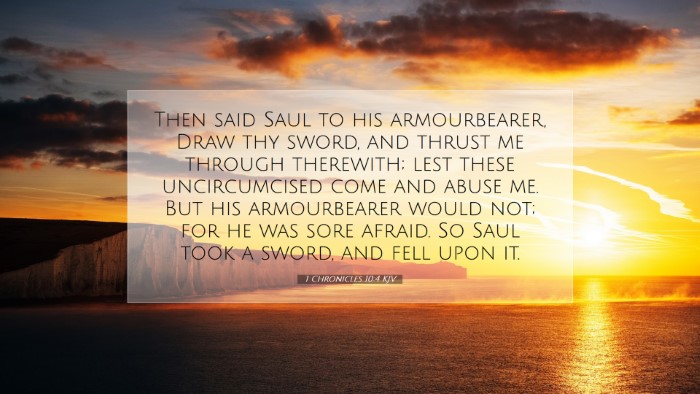Commentary on 1 Chronicles 10:4
1 Chronicles 10:4 states, "Then said Saul to his armor-bearer, 'Draw your sword, and thrust me through with it, lest these uncircumcised come and thrust me through and abuse me.' But his armor-bearer would not, for he was greatly afraid. Therefore Saul took a sword and fell on it."
Overview
This verse occurs in a critical moment in the narrative of King Saul's life, capturing the tragic end of his reign and his desperate circumstances. The scene is rife with emotional and theological significance, as it reflects themes of despair, honor, and the weight of responsibility on leadership.
The Historical Context
Entering the Latter Period of Saul's Reign: This passage takes place during a pivotal battle against the Philistines, a recurring adversary of Israel. Saul's leadership was characterized by both divine appointment and human failure. This moment marks the culmination of his tragic arc—a man chosen by God who falters under pressure.
The Characters: Saul and His Armor-Bearer
Saul's Desperation: As observed by Matthew Henry, Saul's request to his armor-bearer is not merely an act of cowardice; it is reflective of his deep-seated fear and shame. His adversaries, the "uncircumcised," indicated a spiritual and covenantal disdain, as they represented the enemies of God’s chosen people. This low point illustrates the loss of divine favor and Saul’s recognition of his impending defeat.
The Armor-Bearer’s Dilemma: The armor-bearer, as Barnes notes, is a figure of loyalty and respect, bound by duty to his king. His refusal to carry out Saul’s request highlights the moral struggle he faces—torn between the king’s command and his sense of right. The armor-bearer's fear serves as a witness to the weight of Saul’s decisions, capturing the atmosphere of terror that engulfed the battlefield.
Theological Reflections
The Weight of Leadership: This scenario resonates with many theological interpretations regarding leadership and accountability. Clarke posits that Saul’s act symbolizes a tragic miscarriage of purpose, leading one to ponder the burdens placed upon leaders. The moral integrity of a leader is crucial in times of crisis and can significantly impact those they lead.
Dread and Despair: Saul's action is a sobering reminder of despair, evoking feelings of hopelessness in the face of overwhelming odds. His fear of being tortured by the Philistines reveals a flawed view of honor and dignity as he prioritizes his fear over God’s sovereignty. This theme resonates with contemporary issues of mental health, where leaders often struggle in silence, bearing untold burdens.
Lessons for Today’s Readers
- The Essence of Honor: True honor comes from the assurance in God’s promise, not from the absence of defeat. Saul’s tragic end serves as a warning against equating success with divine favor.
- The Importance of Counsel: The scripture illustrates the necessity of wise counsel. The armor-bearer’s hesitance is a poignant reminder for leaders to seek support and companionship in trying times.
- Confrontation with Fear: Saul faced his fears in a way that ultimately destroyed him. Today’s leaders must confront their fears with faith, calling upon God’s strength rather than succumbing to despair.
- Understanding Divine Judgment: This passage serves as an illustration of divine judgment and the consequences of straying from God’s path. Spiritual leaders and scholars must embrace this perspective to understand the serious implications of disobedience.
Conclusion
1 Chronicles 10:4 encapsulates the tragic end of Saul’s monarchy, marked by a poignant moment of his despair and the refusal of his armor-bearer to fulfill a grim request. This narrative not only highlights the depths of personal failure but also reflects the larger spiritual realities of leadership, covenant, and the ever-present possibility of redemption through faith. The passage invites both pastors and theologians to explore the profound implications of this moment in Israel's history, engaging with themes of despair, loyalty, and the weightiness of divine calling amidst human frailty.


